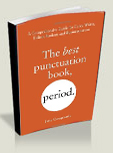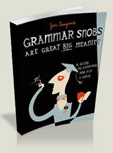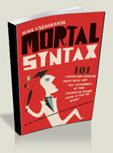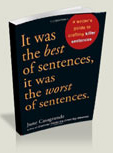

March 3, 2025
'Than I' vs 'Than Me'
TOPICS: GRAMMARTechnically, you can get away with saying, "Bob is taller than me." But stick with "than I" if you want to play it safe.
Click player above to listen to the podcast

This 'whom' is a keeper
Posted by June on March 3, 2025LABELS: GRAMAR, who vs whom
Sometimes it seems like “whom” should die. It causes so many people so much distress. Not many people know how to use it. And a lot of people who think they know how to use it don’t.
For example, I see "whom" used a lot in ways such as this: “John is a man whom I know will always help us when we need him.” People who know that “whom” is an object figure that, in a sentence like this, it’s functioning as an object of the verb “know.” But it’s not. The object of the verb “know” in this sentence is not a single word but a whole clause “who will always help us.” Clauses need subjects. The verb “help” in this clause needs a subject. So correct here would be the subject pronoun “who”: “John is a man who I know will always help us.”
Sometimes it seems “whom” is just mean. And because it’s fading from all from the most formal uses, it’s tempting to look forward to the day we can bid it good riddance.
But here’s why “whom” is not going to die: in one specific construction, people clearly prefer it.
“I’m spending the day with my sister, with who I share many interests.”
That’s totally unnatural, right? Even in the most casual usage, someone who finds herself hemmed in to a sentence like this is going to say “with whom I share” and not “with who.”
In fact, anytime the pronoun comes immediately after a preposition, people seem to prefer “whom”
with whom
to whom
from whom
True, this situation doesn’t come up much. Casual speech usually sidesteps these constructions, for example by putting the pronoun at the beginning and the preposition at the end (“Who are you going to the movies with” instead of “With whom are you going to the movies”). But in those less-common situations, I don’t see “whom” disappearing anytime soon.

- 'Than I' vs 'Than Me'
March 3, 2025 - This 'whom' is a keeper
March 3, 2025 - Reign vs. Rein
February 24, 2025 - 'My boyfriend and I's'?
February 24, 2025 - 'Predominantly' or 'predominately'?
February 17, 2025


June Casagrande is a writer and journalist whose weekly grammar/humor column, “A Word, Please,” appears in community newspapers in California, Florida, and Texas. more


The Best Punctuation Book, Period
A Comprehensive Guide for Every Writer, Editor, Student, and Businessperson
The most comprehensive punctuation guide ever, “The Best Punctuation Book, Period” doesn’t just cover the basic rules. It delves into gray areas of punctuation left unclear by the other rule books, showing how the rules differ in four different editing styles. There's also an A to Z reference of commonly mispunctuated terms. more

Grammar Snobs Are Great Big Meanies
A Guide to Language for Fun and Spite
What do suicidal pandas, doped-up rock stars, and a naked Pamela Anderson have in common? They’re all a heck of a lot more interesting than reading about predicate nominatives and hyphens. June Casagrande knows this and has invented a whole new twist on the grammar book. more

Mortal Syntax
Mortal Syntax takes on the 101 most frequently attacked usage choices. Dedicating one short chapter to each, Casagrande brings her subject to life, teaching English usage through lively and amusing personal anecdotes. more

It Was the Best of Sentences, It Was the Worst of Sentences
Your story may be brilliant. Your insights may be groundbreaking. Your characters may be so real you can almost touch them. But they're not worth a thing if you can't bring them to life in well-written sentences. more


- #AMWRITING
- #SpellCheckCannotSaveYou
- A AAA VS. AN AAA
- A FRIEND OF PLUS POSSESSIVE
- A HISTORIC VS AN HISTORIC
- A WHILE VS. AWHILE
- ABBREVIATIONS
- Acronym
- ACRONYM VS ABBREVIATION
- Acronym vs Initialism
- ACTION VERBS
- ACTIVE VERBS
- ACTIVE VOICE
- ACTUALLY
- ADDRESS STYLE
- ADJECTIVES
- ADRENALINE VS ADRENALIN
- ADVERBIAL
- ADVERBS
- ADVERBS VS. ADJECTIVES
- ADVERBS VS. ADVERBIALS
- ADVERSE AND AVERSE
- ADVERSE VS AVERSE
- ADVISOR vs. ADVISER
- AESTHETIC AND ESTHETIC
- AFFECT AND EFFECT
- AFFECT VS EFFECT
- AGGRAVATE AND IRRITATE
- AGGRAVATE VS IRRITATE
- AGREEMENT
- AI
- ALL INTENTS AND PURPOSES
- ALL RIGHT VS ALRIGHT
- ALONG WITH
- ALRIGHT ALL RIGHT
- AMN'T
- AMONG
- AMPERSAND
- AMPERSANDS
- AN AAA MEMBER OR A AAA MEMBER
- an historic
- AND
- AND AT THE BEGINNING OF A SENTENCE
- AND I VS AND ME
- AND I VS. AND ME
- ANTONYMS
- anxious vs eager
- ANYMORE ANY MORE
- ANYMORE VS ANY MORE
- AP STYLE
- apostrophe
- apostrophe abuse
- APOSTROPHE AFTER A COMMA
- APOSTROPHE IN LETTER GRADES
- Apostrophe in Mothers Day
- Apostrophe in Presidents Day
- APOSTROPHE IN SEASON'S GREETINGS
- Apostrophe in Veterans Day
- APOSTROPHE PROTECTION SOCIETY
- APOSTROPHE VS SINGLE QUOTATION MARK
- APOSTROPHES
- apostrophes for form plurals
- APOSTROPHES IN PLURALS
- APPEARANCE SAKE
- APPOSITIVE
- APROPOS VS APPROPRIATE
- AREN'T I
- AS WELL AS
- ASPECT
- ATONEMENT
- ATTRIBUTIVE NOUN
- ATTRIBUTIVE NOUNS
- AUXILIARY VERB
- AUXILIARY VERBS
- AVOID ADVERBS
- AWAKE
- AWHILE VS. A WHILE
- BACKWARD VS. BACKWARDS
- BAD ADVICE
- BAITED BREATH
- BARBECUE BARBEQUE
- BEACH GOER OR BEACHGOER
- beg the question
- beginning a sentence with and
- beginning a sentence with but
- BEGINNING SENTENCE WITH AND
- BEGINNING SENTENCE WITH CONJUNCTION
- BEGINNING SENTENCE WITH PRONOUN
- ben zimmer
- BENJAMIN DREYER
- BETWEEN
- BETWEEN SENTENCES
- BETWEEN VS AMONG
- BETWEEN YOU AND I
- BETWEEN YOU AND ME
- BIG WORDS
- bimonthly
- biweekly
- BIWEEKLY VS. SEMIWEEKLY
- BOOK TITLES
- BOOK TITLES IN ITALICS
- BOOK TITLES IN QUOTATION MARKS
- BORED BY OR BORED OF OR BORED WITH
- BOTH
- BRING AND TAKE
- Bristol Punctuation Vigilante
- BRITISH ACCENTS
- BRYAN GARNER
- BULLETED LISTS
- BURIED VERB
- BUT A THE BEGINNING OF A SENTENCE
- BUT VS HOWEVER
- CACHE
- CACHET
- CACTUSES OR CACTI
- CAN
- CAN VS MAY
- CAN YOU LEAVE OUT THE WORD THAT
- CANNABUSINESS
- CAPITAL LETTER AFTER A COLON
- capitalization
- CAPITALIZE AFTER A COLON
- CAPITALIZE CITY NAMES
- CAPITALIZE DISHES
- CAPITALIZE JOB TITLES
- CAPITALIZE MENU ITEMS
- CHAISE LONGUE
- CHAISE LONGUE VS CHAISE LOUNGE
- CHAISE LOUNGE VS CHAISE LONGUE
- CHAMPING AT THE BIT
- CHANUKAH
- CHATGPT
- CHICAGO AP STYLE DIFFERENCES
- CHOMPING AT THE BIT
- CHOOSING SPECIFIC NOUNS AND VERBS
- CITE and SIGHT
- CLARITY
- CLATFART
- CLICHES
- CLITIC
- COLLECTIVE NOUNS
- COLON
- COLON TO INRODUCE QUOTATION
- COLON VS PERIOD
- COLON VS. SEMICOLON
- Colons
- comma
- COMMA AFTER INC
- COMMA AFTER STATE
- COMMA AFTER YEAR
- COMMA BEFORE A TITLE
- COMMA BEFORE AND
- COMMA BEFORE TOO
- COMMA IN IS IS
- COMMA SPLICE
- COMMA VS PERIOD
- COMMANDS
- COMMAS
- commas around inc.
- COMMAS BETWEEN ADJECTIVES
- commas between coordinate adjectives
- COMMAS INSIDE QUOTATION MARKS
- COMMAS TO SET OFF INFORMATION
- COMMON GRAMMAR MISTAKES
- COMMON SPELLING ERRORS
- COMMONLY CONFUSED EXPRESSIONS
- COMMONLY CONFUSED VERBS
- COMMONLY CONFUSED WORDS
- COMPARATIVE
- COMPARATIVES
- comparatives and superlatives
- COMPARE TO VS COMPARE WITH
- COMPARED TO COMPARED WITH
- COMPLEMENT OF A COPULAR VERB
- COMPLETE SENTENCE
- COMPLIMENT AND COMPLEMENT
- COMPLIMENT VS COMPLEMENT
- COMPLIMENT VS. COMPLEMENT
- COMPOSE AND COMPRISE
- COMPOSE VS COMPRISE
- compound adjectives
- COMPOUND MODIFIER
- compound modifiers
- COMPOUND NOUN
- CONCISE WRITING
- CONCISENESS
- conjunctions
- CONJUNCTIVE LIKE
- CONTINUAL AND CONTINUOUS
- COORDINATE ADJECTIVES
- COORDINATION
- COPULAR VERBS
- copy editin
- COPY EDITING
- CORONAVIRUS SLANG
- COULD CARE LESS VS COULDN'T CARE LESS
- COULD OF and COULD HAVE
- COUPLE IS OR COUPLE ARE
- COUPLE IS VS. COUPLE ARE
- COURTESY TITLES
- COVIDIOT
- CRINGE AS AN ADJECTIVE
- DANGLER
- danglers
- DANGLING MODIFIER
- DANGLING PARTICIPLE
- dash
- DASH VS HYPHEN
- DASH VS PERIOD
- DASH VS SEMICOLON
- DASH VS. COLON
- DASHES
- decimate
- decimate usage
- DECLARATIVE
- DECLARATIVE QUESTION
- DEFINITE ARTICLE
- DEPENDENT CLAUSE VS. SUBORDINATE CLAUSE
- DICTIONARIES
- DIFFERENT FROM VS DIFFERENT THAN
- DIFFERENT SPELLINGS FOR SAME WORD
- DIRECT OBJECTS
- DISINTERESTED UNINTERESTED
- DISJUNCTS CONJUNCTS ADJUNCTS
- DISSATISFIED VS. UNSATISFIED
- DO'S AND DON'TS
- done vs finished
- DOS AND DONTS
- DOUBLE NEGATIVE
- DOUBLE POSSESSIVE
- DOUBLE SPACE AFTER A PERIOD
- DOUBLE SPACING
- DREAMED VS DREAMT
- DUMMY OPERATOR
- EACH
- EACH IS OR EACH ARE
- EASILY CONFUSED WORDS
- ECONOMY OF WORDS
- EDITING
- EDITING NOTES
- EDITING YOUR OWN WRITING
- EFFECTIVE WRITING
- EFFETE
- EGGCORN
- EITHER
- ellipses
- ELLIPSIS
- EM DASH VS EN DASH
- EM DASHES
- EMAIL E-MAIL
- EMAIL GREETINGS
- EMIGRATE AND IMMIGRATE
- EN DASH
- EN DASH VS EM DASH
- ENGLISH
- enormity
- ENSURE INSURE
- ENSURE VS INSURE
- ERRANT APOSTROPHES
- ETYMOLOGY
- EVACUATE
- EVERY DAY VS. EVERYDAY
- EXCLAMATION POINT
- EXCLAMATION POINTS
- EXCLAMATORY
- EXISTENTIAL THERE
- FALSE RANGES
- FAMILY SINGULAR OR PLURAL
- FARTHER
- father's day
- faulty parallel
- FAULTY PARALLELS
- FAULTY SENTENCE STRUCTURE
- FAZE and PHASE
- FICTION WRITING
- FIRSTLY
- FIVE BASIC SENTENCE STRUCTURES
- FLAT ADVERBS
- FLESH OUT AND FLUSH OUT
- FLOUNDER VS FOUNDER
- FLUSH OUT VS. FLESH OUT
- FOR CONSCIENCE SAKE
- FOR GOODNESS SAKE
- FORGO AND FORGO
- FORGO FOREGO
- FORGONE FOREGONE
- FORM TYPES OF VERBS
- FORTE
- FORWENT FOREWENT
- FOUNDER VS. FLOUNDER
- FRAUGHT VS FRAUGHT WITH
- FRIEND OF
- FURTHER
- Fused Participle
- GAUNTLET GANTLET
- GENERIC PRONOUN ONE
- GET
- GIFT BOOKS
- GIFT GUIDE
- GOER
- GOOD AND WELL
- GOOD SENTENCES
- GOOD THINGS COME TO HIM WHO WAITS
- GOOD VS WELL
- GOODNESS SAKE
- GOT VS. HAVE
- GOT VS. HAVE GOT
- GRADUATE COLLEGE OR GRADUATE FROM COLLEGE
- GRADUATE COLLEGE VS GRADUATE FROM COLLEGE
- GRAMAR
- GRAMM
- GRAMMAR
- GRAMMAR BOOKS
- GRAMMAR CHECKER
- GRAMMAR MYTH
- grammar peeves
- grammar phobia
- GRAMMAR TERMS
- GRAMMATICAL MOOD
- GRAY VS GREY
- GREAT AND WELL
- GREATLY
- GREETING
- GRMMAR
- GROGNARD
- HANGED VS HUNG
- HANUKKAH
- HARK
- HARKEN
- HARSH WRITING ADVICE
- HAVE GOT
- HAVE GOT VS HAVE
- HE OR HIM
- HEADQUARTER AS A VERB
- HEADQUARTERED
- HEALTH CARE HYPHENATED
- HEALTHCARE VS HEALTH CARE
- HEALTHFUL
- HEALTHY
- HEARKEN
- HELTER SKELTER
- HERE'S BEFORE A PLURAL
- HERE'S VS HERE ARE
- HISTORIC VS HISTORICAL
- HOI POLLOI
- HOME IN VS HONE IN
- HOMO SAPIEN VS. HOMO SAPIENS
- Homographs
- HOMONYMS
- Homophones
- HOMOPHONES AND HOMOGRAPHS
- HOPEFULLY
- HOW TO CAPITALIZE HEADLINES
- HOW TO PRONOUNCE FORTE
- HOW TO PRONOUNCE KYIV
- HOW TO PUNCTUATE CHRISTMAS CARDS
- HOW TO WRITE
- HOW TO WRITE BOOK TITLES
- how to write holidays
- HOW TO WRITE MOVIE TITLES
- HOW TO WRITE PLURAL LAST NAMES
- HUMAN VS. CHATGPT
- Human writers
- HYPHEN
- HYPHEN WITH MAKER
- HYPHENATING NOUNS
- HYPHENATING PREFIXES AND SUFFIXES
- HYPHENATING SUFFIXES
- HYPHENATING VERBS
- hyphenation
- hyphens
- I AM GOOD OR I AM WELL
- I FEEL BAD VS I FEEL BADLY
- I FEEL BADLY
- I LAY DOWN OR I LAID DOWN
- I vs Me
- I VS. ME
- I-N-G VERBS
- I'S
- IAN MCEWAN
- IDIOMS
- IDIOT'S APOSTROPHE
- if and whether
- IF VS WHETHER
- immigrate emigrate migrate
- IMPACT AS A VERB
- IMPERATIVE
- imperatives
- IMPORTANTLY
- IN REGARDS TO
- INCLUDE
- INCLUDING BEFORE A COMPLETE LIST
- INCOMPLETE SENTENCES
- INDEFINITE ARTICLES
- INDEFINITE PRONOUNS
- INDEXES INDICES
- INDIRECT OBJECT
- INDIRECT OBJECT PRONOUN
- INDIRECT OBJECTS
- insure vs ensure
- INTENSIFIER
- INTERROGATIVE
- INTO VS IN TO
- INTRANSITIVE VERBS
- INTRODUCTORY PHRASE
- INTRUSIVE OF
- IRREGARDLESS
- IRREGARDLESS AND REGARDLESS
- IRREGULAR NOUNS
- IS IS
- IS TEAM PLURAL OR SINGULAR
- IS WRONG AN ADVERB
- IT IS I WHO AM VS IT IS I WHO ARE
- IT'S VS ITS
- ITALICS
- ITALICS VS. QUOTATION MARKS
- ITS AND IT'S
- ITS VS IT'S
- JACK SMITH
- JACOB REES-MOGG
- JANUARY 6 INSURRECTION
- JARGON
- JOB TITLES
- john dowd
- John Le Carre
- JOHN MCINTYRE
- JONATHON OWEN
- Journalism Standards
- JUDGEMENT VS JUDGMENT
- KORY STAMPER
- LANGUAGE
- LAY AND LIE
- LAY IN STATE
- LEAD VS. LED
- LEGAL WRITING
- LESS THAN
- less vs fewer
- LET'S AND LETS
- LET'S EAT GRANDMA
- LET'S VS. LETS
- LEXICOGRAPHY
- LIE IN STATE
- lighted vs lit
- LIGHTED VS. LIT
- LIKE
- LIKE AND AS
- LIKE AND SUCH AS
- LIKE VS SUCH AS
- LINKING VERBS
- LIT VS LIGHTED
- LITERALLY
- LOAN VS LEND
- LOG IN VS LOGIN
- LONG SENTENCES
- LOWERCASE AFTER A COLON
- LY ADVERBS
- MAIN CLAUSE
- MAIN CLAUSES
- MAJORITY
- MAKING
- MAMA VS MOMMA
- MANAFORT
- MANIKIN MANNEQUIN
- MANNER ADVERBS
- MARY NORRIS
- MASS NOUNS VS COUNT NOUNS
- MAY VS. MIGHT
- ME VS I
- MEDIUMS
- MERRIAM
- METACONCEPTS
- MIKE PENCE
- MIKE POMPEO
- MISCHIEVOUS VS. MISCHIEVIOUS
- MISLEADING CONNECTIVES
- MODAL AUXILIARIES
- MODAL AUXILIARY
- MODALITY
- modifying phrases
- MOOD
- MORE CLEAR VS CLEARER
- MORE THAN
- MOST COMMON APOSTROPHE ERRORS
- MOST COMMON GRAMMAR ERRORS
- Most common grammar mistakes
- mother's day
- MOVIE TITLES
- MUST
- MYRIAD VS A MYRIAD OF
- MYRIAD VS. MYRIAD OF
- MYSELF
- MYSELF VS. ME
- NAMES
- NATIONAL GRAMMAR DAY
- NEEDLESS WORDS
- Neil Gaiman
- NEITHER
- NEOLOGISMS
- NEVER MIND / NEVERMIND
- NEW WORDS
- NEW YEAR'S
- NEXT
- NEXT VS. THIS
- NGRAM VIEWER
- no problem
- NOMINAL ADJECTIVES
- NOMINALIZATION
- NOMINALIZATIONS
- NONBINARY THEY
- NONCE WORD
- NONE IS VS NONE ARE
- NONPLUSSED
- NONRESTRICTIVE CLAUSES
- NOTIONAL SUBJECTS
- NOUNS AS ADJECTIVES
- NOUNS ENDING IN S
- object complement
- OBJECT PRONOUN
- OBJECT PRONOUNS
- OBJECT VS SUBJECT PRONOUNS
- OBJECTS AND SUBJECTS
- OBJECTS OF PHRASAL VERBS
- obscenity
- OCTOPUSES OR OCTOPI
- OED
- OK OKAY
- OLDER OF TWO VS OLDEST OF TWO
- OLIVER TWIST
- OMIT NEEDLESS WORDS
- ONE
- ONE OF THE ONLY
- ONE SPACE
- ONE SPACE AFTER A PERIOD
- ONE SPACE OR TWO BETWEEN SENTENCES
- ONLY
- ONTO VS ON TO
- OR
- OVER
- OVER AND UNDER
- oxford comma
- OXFORD ENGLISH DICTIONARY
- PALATE VS PALETTE
- PALETTE PALATE PALLET
- PALETTE VS. PALLET
- PALM OFF VS PAWN OFF
- PALM OFF VS. PAWN OFF
- PARALLEL STRUCTURE
- PARENTHESES
- PARTICIPIAL PHRASES
- PARTICIPLE VS. PARTICLE
- PARTS OF SPEECH
- PASSIVE VOICE
- past participles
- past tense
- PAST TENSE OF LAY
- PAST TENSE OF LIGHT
- PAST TENSE OF SLAY
- period before a quotation mark
- PERIODS IN INITIALS
- PERIODS IN PHD
- PERIODS INSIDE QUOTATION MARKS
- PERSONAL PRONOUNS
- PERUSE
- PETER SOKOLOWSKI
- PHRASAL VERBS
- PIQUE
- PIRATE TALK
- PLACEMENT OF OBJECT
- placement of only
- PLACEMENT OF PREPOSITION
- plead pled
- PLURAL
- PLURAL NAMES
- PLURAL OF ATTORNEYS GENERAL
- PLURAL OF MEDIA
- PLURAL POSSESSIVE
- PLURAL POSSESSIVES
- PLURAL POSSESSIVES OF PROPER NOUNS
- PLURAL VERB
- PLURAL VERB WITH AS WELL AS
- PLURAL VERBS
- PLURALS
- PLURALS OF LATIN WORDS
- PLURALS OF LETTERS
- PLURALS OF MOVIE TITLES
- POSSESSIVE
- POSSESSIVE PRONOUNS
- Possessive with Gerund
- possessives
- POSSESSIVES OF LAST NAMES
- POSSESSIVES OF MOVIE TITLES
- POSSESSIVES OF PROPER NAMES
- PREDICATE NOMINATIVE
- PREDOMINATELY VS PRDOMINANTLY
- prefixes
- PREPOSI
- PREPOSITION AT THE END
- PREPOSITIONS
- PRESCRIPTIVISM
- PRETENSE VS PRETEXT
- PREVENTATIVE
- PREVENTIVE
- PREVENTIVE VS PREVENTATIVE
- PRINCIPAL AND PRINCIPLE
- PRINCIPLE and PRINCIPAL
- profanity
- PRONONCIATION
- PRONOUN ANTECEDENT AGREEMENT
- PRONOUNS
- PRONOUNS IN SHARED POSSESSIVES
- PRONOUNS INDEFINITE PRONOUNS
- pronunciation of often
- proofreading
- PUNCTUATION
- PUT A COMMA BEFORE TOO
- QUASI COORDINATOR
- QUASI POSSESSIVES
- QUESTION MARK
- QUOTATION ATTRIBUTION
- quotation marks
- QUOTATIONS
- QUOTE VS QUOTATION
- raise the question
- RANG RUNG
- RANGES
- READER FRIENDLY LANGUAGE
- REDUPLICATIVE COPULA
- REFLEXIVE PRONOUNS
- REFLEXIVES
- REIGN VS REIN
- REIN vs REIGN
- REIN VS. REIGN
- RELATIVE PRONOUN ANTECEDENT AGREEMENT
- RELATIVE PRONOUNS
- RESTRICTIVE CLAUSES
- RIGHT VS RIGHTLY
- ROB AND BURGLARIZE
- ROCK N ROLL
- RUN-ON SENTENCES
- RUTH BADER GINSBURG
- SAYS VS. SAID
- SCARE QUOTES
- SECONDLY
- SEMICOLON
- SEMICOLON ABUSE
- SEMICOLONS
- semimonthly
- semiweekly
- SENTENCE ADVERBS
- sentence diagramming
- SENTENCE ENDING PREPOSITION
- SENTENCE ENDING PREPOSITIONS
- SENTENCE FRAGMENT
- SENTENCE FRAGMENTS
- SENTENCE STRUCTURE
- SENTENCE STRUCTURES
- SENTENCE WRITING
- SENTENCES
- serial comma
- SHARED POSSESSIVE
- SHARED POSSESSIVES
- SHORT SENTENCES
- SHOULD
- SIMPLE COMPOUND AND COMPLEX SENTENCES
- SINCE VS BECAUSE
- SINCE VS. BECAUSE
- SINGLE QUOTATION MARK
- SINGULAR AUSPICE
- SINGULAR VERB
- SINGULAR VERB WITH EVERY
- SINGULAR VS PLURAL
- SITE
- SKUNKED TERMS
- SLAVA UKRAINI
- SLEIGHT VS SLIGHT
- SLOW VS. SLOWLY
- SMIZE
- SNEAK PEAK VS SNEAK PEEK
- SNEAK VS. SNUCK VS. SNEAKED
- SO
- SO AT THE BEGINNING OF A SENTENCE
- SO CRINGE
- SO HELP ME GOD
- SOMEONE
- SPACE AROUND DASHES
- spaces around ellipses
- SPACES BEFORE AN ELLIPSIS
- SPACING BETWEEN SENTENCES
- SPEECH TAGS
- spell check fail
- SPELL-CHECKER
- SPELLING
- SPIT AND IMAGE
- SPITTING IMAGE
- split infinitive
- SQUINTING MODIFIER
- STARTING A SENTENCE WITH AND
- STEPHEN CALK
- STREAMLINING SENTENCES
- STRUNK AND WHITE
- STYLE
- STYLE GUIDES
- SUBJECT OBJECT AGREEMENT
- SUBJECT PRONOUNS
- SUBJECT VERB AGREEMENT
- SUBJECT-COMPLEMENT AGREEMENT
- SUBJECT-OBJECT AGREEMENT
- SUBJUNCTIVE
- SUBORDINATE CLAUSES
- SUBORDINATING CONJUNCTIONS
- suffixes
- SUPERLATIVES AND COMPARATIVES
- SWAM VS. SWUM
- SYNONYMS
- TENSE SHIFTS
- terminal punctuation
- THAN I VS THAN ME
- THANKSGIVING DAY
- THAT AND WHICH
- THAT VS. WHICH
- THAT VS. WHO
- THE ELEMENTS OF STYLE
- THE JOY OF SYNTAX
- The Possessive of Jr.
- THE REASON IS BECAUSE
- THE REASON WHY
- THE REASON WHY VS. THE REASON THAT
- THE TEAM IS VS THE TEAM ARE
- THE WIRE
- THERE ARE
- THERE IS
- THERE'S
- THERE'S BEFORE A PLURAL
- THERE'S VS. THEIRS
- THESE ONES
- THEY'RE AND THEIR
- THIS IS HER
- THIS IS SHE
- THRU THROUGH
- THRU VS THROUGH
- TILL TIL UNTIL
- TITLED VS ENTITLED
- TITLES
- TITLES IN ITALICS
- TITLES IN QUOTATION MARKS
- TO BOLDLY GO
- TOO BIG A DEAL
- TOO BIG OF A
- TOO BIG OF A DEAL
- TOWARD VS. TOWARDS
- TRANSITIVE
- TRANSITIVE VERBS
- TRANSITIVE VS. INTRANSITIVE VERBS
- TROOPER VS TROUPER
- TRUMP SPELLING
- TRUMP TWEET
- TRY AND
- TRY TO
- TWO SPACE
- TYPOS
- UNCLEAR ANTECEDENTS
- UNDERLIE PAST TENSE
- UNDERWAY / UNDER WAY
- UNNECESSARY ADJECTIVES
- UNNECESSARY ADVERBS
- UPSIDE DOWN SUBORDINATION
- USAGE
- VAGUE WORDS
- VARIANT SPELLINGS
- VARIETY IS OR VARIETY ARE
- VERB AGREEMENT
- VERB ASPECT
- VERB CONJUGATION
- VERB TENSE
- VERB TENSES
- VERBS
- veterans day
- VIS-A-VIS
- vocabulary
- WAS VS WERE
- WAVER VS. WAIVER
- WEBSTER'S NEW WORLD
- WEIRDEST LANGUAGES
- WELLBEING
- WERE VS WAS
- What Does Hoi Pollio Mean
- WHAT IS THE PLURAL OF JONES
- WHAT'S AN APPOSITIVE
- When to Capitalize After a Colon
- WHEN TO CUT OUT THE WORD BOTH
- WHEN TO HYPHENATE PREFIXES
- WHILE VS ALTHOUGH
- WHILE VS THOUGH
- WHO AND WHOM
- WHO KNOWS
- who vs whom
- WHOA WOAH WHOAH
- whom
- whomever
- WHOMEVER VS WHOEVER
- WHOMEVER VS. WHOEVER
- WHOSE AND WHO'S
- WHOSE VS WHO'S
- WHOSE VS. WHO'S
- WISH I WAS VS WISH I WERE
- WITH VS. OF
- WOKE VS WAKED
- WON VS. BEAT
- WORD CHOICE
- WORD TRENDS
- WORD USAGE
- WORDINESS
- WORSE COMES TO WORST VS WORST COMES TO WORST
- WRACK VS RACK
- WRITING
- WRITING ADVICE
- WRITING BOOKS
- WRITING CRAFT
- WRITING FOR CLARITY
- WRITING SKILLS
- WRITING STYLE
- WRITING TIPS
- WRONG VS WRONGLY
- WRONG VS. WRONGLY
- XMAS
- ZEGUMA
- ZERO RELATIVE PRONOUN
search
podcast
Ad Podcast to your site
A Pearson product. Copyright © 2011 Pearson Education, Inc. All rights reserved. Legal Notice | Privacy Policy | Permissions















Is 'Alright' All Right?
Amy Lechter I believe I should have put my comments above into this space. Oh well, hope you might take a moment to respond. I have just watched some of your podcasts and appreciate your direct and honest voice :>) http://amysiegeltutoring
Is 'Alright' All Right?
amy lechter-siegel I am a former college and high school classroom English teacher and now high school and college critical reading and writing tutor and I know and have used so many grammar programs (Easy Grammar with its emphasis on first expunging prep phrases to more easily discern the parts of the sentence is one of my favorites; I like Diane King for a clear basic program as I work with LD students; I like Kahn Academy for its having a teacher with a white board; I like many others as well). None do I LOVE because they are a bit clumsy to use and, though being systematic, structured and exhaustive (as are many of the programs named)is ideal, my students do not/cannot buy into a hundred lessons. Do you have ideas (including your own work of course)for what might constitute an 8-10 lesson program on the most important elements of grammar and (especially) syntax with an audio visual component that would be both systematic and somewhat FUN. Thank you so much. I have ordered your books but, again, I want something short and sweet to use as a "Summer Writing Workshop." http://amysiegeltutoring.com
Should you capitalize 'city' in 'city of Boston'?
M Actually, Chicago capitalizes City if you're talking about the government entity but not if it's talking about the area, so the City of Boston's ordinance vs. the city of Boston's population.
'All told' or 'all tolled'?
PJB Toll also means to add up. So, all tolled, as in, accounted for, is still correct.
Should you pronounce the T in 'often'?
David Merriam-Webster online lists the spoken T first. I'd say it's a toss-up.